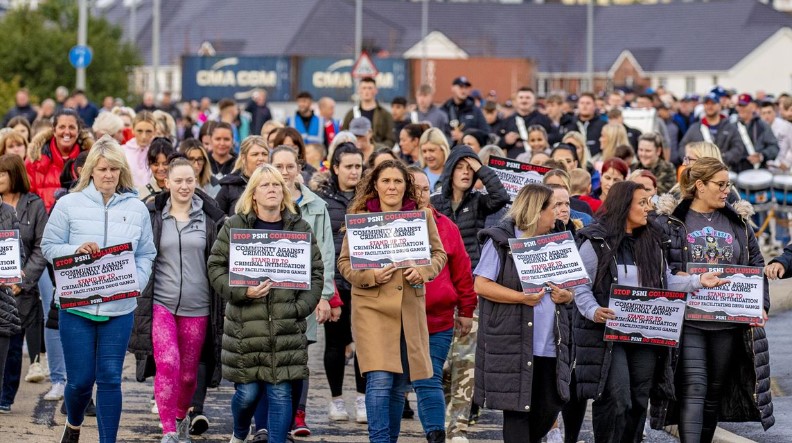By John Pickard
Since the end of the Troubles in Northern Ireland, the Loyalist paramilitaries that had been active have not disarmed, but have largely morphed into criminal gangs: dealing drugs, intimidating local residents and not infrequently conducting bloody feuds between themselves. But there are more signs that local workers have had enough.
The problem is so serious that the Police Service of Northern Ireland, the PSNI, has a special task force for ‘Paramilitary Crime’. As this special unit were conducting a raid in the Weavers Grange area of Newtonards on Monday, a march was held of locals, largely led by women, demanding an end to the drugs gangs. According to the Belfast Telegraph (July 10), as many as 600 took part in the protest, under the slogans, ‘stand up to criminal intimidation’ and ‘stop facilitating drug gangs’. [Picture top, from the Belfast Telegraph]
At the end of the demonstration, to great applause from all of those who marched, five of the women who organised the march handed in a letter to the police demanding action. Incredibly, according to the Belfast Telegraph, one paramilitary group, the so-called ‘Real Ulster Freedom Fighters’ threatened to “shoot and bomb women and children” if the march had followed its original planned route past the Weavers Grange estate. It had been for that reason that the original route was banned by the Parades Commission and an alternative negotiated.
The protest group, calling themselves ‘Ards and North Down Against Criminal Gangs’ reflects the real concern of ordinary workers about criminality, which is conducted under a very thin veil of ‘political’ loyalism. The march is an echo of the much bigger marches and strikes of workers that took place in the later period of the Troubles and which in many respects gave the impetus to the negotiations that led to the Good Friday Agreement and the ceasefires.
UDA still intimidating Catholics out of their homes
It is an unfortunate fact that sectarianism is still deeply entrenched in the whole of political life of Northern Ireland, and the ongoing criminal activities of the UDA, now as criminal gangs, is perhaps the most glaring feature of that. Among other things, in some areas they are still in the dirty business of intimidating Catholic families from their homes.
In the same issue of the Belfast Telegraph that reported the march in Newtonards, there was a report that the UDA was flying flags in the housing estate in the town of Lurgan where they had recently forced a young Catholic mother to flee her home.
It takes great courage for working class women like those in Newtonards to protest against the activities of these armed and dangerous criminal gangs. They should be helped, and their demands echoed by the potentially much louder voices of the wider labour and trade union movement, like the Northern Ireland Committee of the Irish Congress of Trade Unions, or even the Labour Party in Britain.
The sectarian divide that runs right through politics is not a ‘natural’ outgrowth of working class life, which is broadly the same across the divide. Whether Protestant or Catholic, workers face the same problems of declining living standards and collapsing government and local authority services.
That sectarianism is a product of the failure or the absence of politicians to put forward a political programme that would appeal to both sides of the community, a programme to bring about real improvements on jobs, living standards, homes and services. Even when it had massive support in the North the Labour Party under Jeremy Corbyn refused to put forward Labour candidates in Northern Ireland and that, arguably, was one of his greatest failings.



